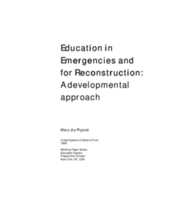Education is not a relief activity; it is central to human and national development and must be conceptualized as a development activity. In emergency situations educational activities must be established or restored as soon as possible. Where education systems have been rendered nonfunctional, the rebuilding of the system provides an excellent opportunity for transforming education so that it meets the learning needs of diverse groups within a given population. In any country education can also serve as a mechanism for contributing to the prevention of emergencies. In many countries it is necessary to have an emergency preparedness plan and it is essential to know what to do to support education in the event an emergency breaks out. Examples and suggestions are provided.
The paper outlines a set of broad strategies for UNICEF’s work in education in emergencies, and provides a summary of the organization’s approach, some practical information on implementation, and an identification of areas where more work is needed. It is intended to provide information and to stimulate the debate on how UNICEF’s approach to education in situations of crisis and chronic instability can be further refined.
The developmental approach to education advocated in the paper is in line with UNICEF’s new perspectives on programming in situations of crisis and chronic instability. The publication is particularly well-timed as UNICEF moves towards closer integration of its emergency response into normal country programming, and begins to focus more systematically on emergency preparedness in every country programme, and a more flexible approach to country programming.
The target audience is UNICEF staff involved in education and programming issues, especially in crisis and chronic instability, as well as professionals in other organizations.
©UNICEF

